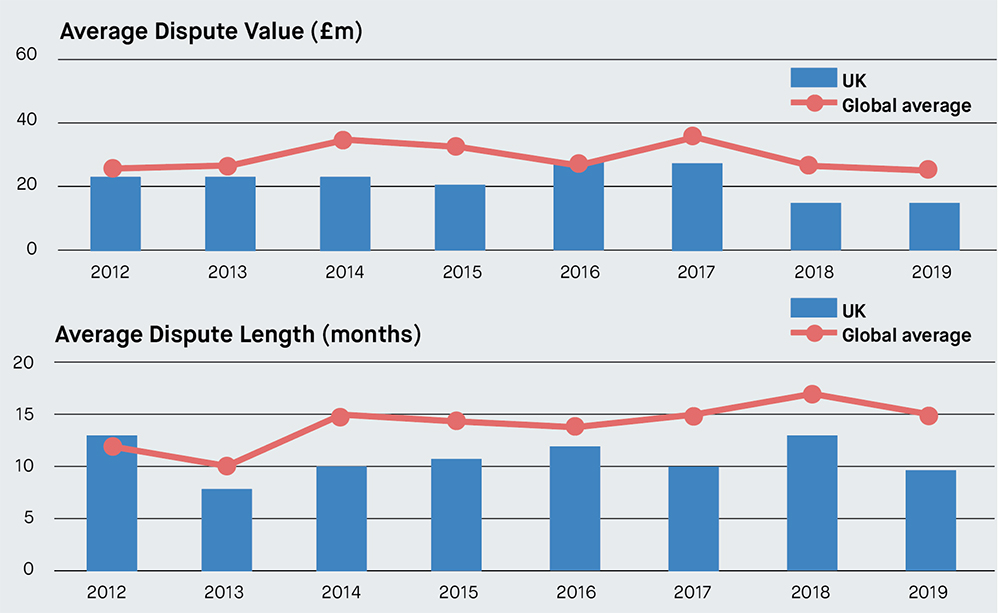The UK leads the world in resolving construction legal disputes, but there is plenty of room for improvement, Says Gary Kitt.
The UK continues to be the jurisdiction with the quickest average resolution time for construction disputes – and it also has the lowest average value.
The Arcadis Global Construction Disputes Report 2020, based on research among legal professionals last year, showed a similar volume of construction disputes as during 2018, with the average value remaining consistent at £14.1m ($17.8m). The global average was £24.4m ($30.7m). For the same period, UK survey respondents recorded a 23% drop in the average time taken to resolve disputes to 9.8 months, from 12.8 months in 2018.
Dispute causes
During 2019, a failure to make interim awards on extensions of time and compensation became the top ranked common cause of disputes in the UK.
While this replaces a failure to properly administer the contract, the top cause in the previous five years, it continues a trend of the top dispute cause relating to those administering contracts. Repeating 2018’s findings, over 75% of respondents reported that conduct of the project manager or engineer was always or very often at the heart of how the dispute crystallised – most commonly a lack of understanding of the procedural aspects of the contract.
It is therefore unsurprising that over 60% of respondents stated that proper contract administration would have the single largest impact in avoiding disputes in which they were involved.
The second ranked common dispute cause is again the contractor or subcontractor failing to understand or comply with its contractual obligation.
This suggests that contract obligations drafted in plain English, such as the NEC forms, are not as easily understood by practitioners as the lawyers drafting them.

Perhaps it is time for greater representation of true practitioners on the contract-drafting bodies to ensure those administering contracts understand the consequences of their actions or inactions. Greater use of more collaborative standard forms of contracts, such as PPC 2000, might provide more confidence in project delivery. However, little appetite has been shown for these types of contracts, bearing in mind it is now almost 20 years since the PPC forms were introduced.
Resolution techniques
The UK saw a return of adjudication, contract or ad hoc, as the most common dispute resolution method, replacing party-to-party negotiation which dropped to second place in 2019.
Arbitration replaced mediation as the third most common resolution method in the United Kingdom. The recent introduction of some low value or low cost arbitration schemes, such as the Chartered Institute of Arbitrators’ Business Arbitration Scheme, could explain this trend.
While the industry should welcome further forms of lower cost dispute resolution, it is concerning that no early resolution methods appear in the top three.
In recent years there has been a concentrated effort to promote the benefits and use of mediation, such as the Construction Industry Council’s Model Mediation Agreement and Procedure, because of its typical lower time and cost benefits. Unfortunately, this is not reflected in this year’s results.

Mitigation of disputes or early resolution chiefly depends on a willingness to compromise by the owner or contractor. This was ranked as the most important factor by respondents, ahead of contract-mandated early resolution forms, such as the avoidance processes implemented by Network Rail and Transport for London.
Positively, over half of respondents regarded the cost of resolution – compared to value of outcome – as the most important factor when considering whether a dispute was successful or not. We hope this may signal a shift in dispute resolution methods deployed and that we will see an increase in party-to-party negotiation, mediation, and other forms of early dispute resolution.
Solutions looking forward
The impacts of covid-19 will certainly change the industry and present new challenges. However, one source of positivity has been the collaboration of numerous stakeholders to produce the NHS Nightingale Hospitals to deal with the pandemic. These projects are fantastic examples of using collective efforts to produce project excellence. The industry should learn from these projects, with confidence and trust in the benefits of closer working.
If, as seems likely, the industry enters another recession, we hope that clients, contractors and other stakeholders will draw upon lessons of the previous global financial crisis in 2008, improving collaboration. It would be naïve to think that parties in a commercial world will always approach a project from the same viewpoint, however an increase in the early engagement of the supply chain and conjoined approaches could assist in reducing the impacts of any financial downturn.
Further collaboration is needed between parties drafting clauses and obligations in contracts, with a focus on those who will be delivering the works. A change in mentalities is required from all industry stake-holders as the contractual clauses cannot achieve project excellence on their own. We encourage parties to make administration of contracts easier.
Additionally, increased use of BIM and other collaborative risk management tools can help all parties understand project needs and goals.
We encourage stakeholders to deploy more efforts in the early resolution of disputes, especially those with known time and cost benefits, to minimise the potential impacts arising from differences. 2020 will pose a challenging period for the industry, but through collaborative efforts we can seek to change for the better. There has never been a better opportunity for positive change.
Gary Kitt is head of UK contract solutions at Arcadis and co-author of the Global Construction Disputes Report 2020
Comments
Comments are closed.











Collaboration is always going to be key with avoiding disputes. Too often the lack of simple process and consideration of what is fair, along with people simply not knowing what they are contracted to do leads to frustration and petty disputes. This in turn builds into intrenched views and opinions that drag us in actions that waste time, effort, margin and destroy relationships.
Simple conflict avoidance would benefit us all and improve the figures in this report.